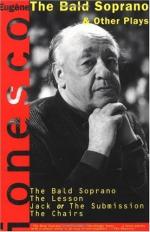|
This section contains 1,674 words (approx. 5 pages at 400 words per page) |

|
Fiero is a professor of English at the University of Southwestern Louisiana, where he teaches drama and play writing. In this essay he discusses the interrelationship of Ionesco's anti-play elements in The Bald Soprano, including character, language, and structure.
The Bald Soprano (1950) is Eugene Ionesco's first "anti-play," conceived and created as a deliberate spoof or parody of the plays then in vogue in Paris. Ionesco was attempting to create "a new free theatre," one devoid of theme, ideology, social realism, philosophy, and the thin "boulevard" psychology then pervading French drama. His targets were the complacent bourgeoisie and intellectual drones who went to see plays that fed them nothing to challenge their smug certainty that such matters as social injustice could be ameliorated through political convictions and rational discourse. For Ionesco, the very efficacy of language was in question, something far more fundamental and troubling than the passing...
|
This section contains 1,674 words (approx. 5 pages at 400 words per page) |

|




